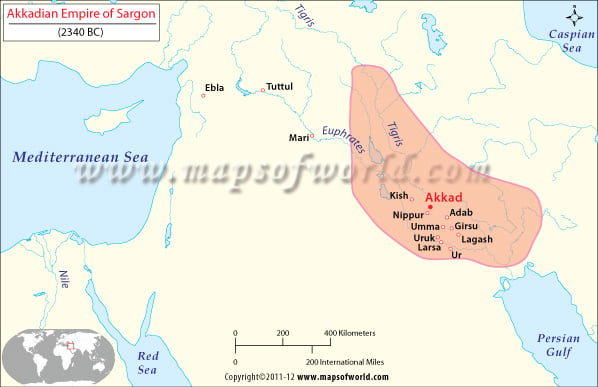The origins of the Akkadian civilization (roughly 2700 – 2154 BC) can be traced back to the settlement of Arabian Bedouins in Mesopotamia around the third millennium BC. These Semitic settlers spoke their own Akkadian language, quite different from that of the indigenous Sumerians.
The Akkadians learned much from the Sumerian society and even adopted the Sumerian pantheon. Despite this, the Akkadians fiercely guarded their linguistic traditions.
The Akkad civilization centered on Kish and thrived in central Mesopotamia, coexisting peacefully for a long time with the southern Sumerians in the city-states of Lagash, Uruk, and Ur.
First Empire of the World
The first empire of the world was built by King Sargon of Akkad. Sargon’s conquest of Sumer in the twenty-third century BC led to an annexation of Uruk, Ur, Lagash, and Umma. By 2270 BC, Sargon had annexed Kazalla, Ebla, and Mari. He pushed farther north toward the Taurus Mountains and captured parts of Lebanon from the Hurrians. To the east, Sargon annexed western Elam. Magan in Oman was captured for its copper ores. Sarru-Kinu Sargon (Sargon the True King), as he proclaimed himself, ruled all the land between the Mediterranean Sea and the Arabian Gulf at the time of his death in 2279 BC.
Sargon’s multiethnic empire spanned across Mesopotamia and the Fertile Crescent, and he established a dynasty that ruled for over a hundred and fifty years. Sargon is believed to have earned a mention in the Bible as the founder of Babylon, Nimrod.
Curse of Akkad
Naram-Sin, the grandson of Sargon, took to furthering the boundaries of the Akkadian Empire. The subsequent fall of the empire is attributed primarily to crop failure and the invasions of Gutian and Amorite tribes. Popular mythology, however, attributes the fall to Naram-Sin’s conquest of Nippur. The king’s profanation of the E-Kur Temple is said to have invoked the wrath of the god, Enlil. Ancient texts refer to a curse placed on Akkad by the priests of Nippur. Modern-day scientists believe that drought, not invasion, led to the fall of the empire. A global dust spike caused by climate change is believed to have wiped out entire cities in the civilization.
“Your Friend, My Friend. Your Enemy, My Enemy” – Akkadian-Hittite Treaty
Among the earliest known political alliances of the world is the Akkadian treaty with the Hittites. The treaty bound the Akkadians and the Hittites in a political and military alliance quite similar to modern alliances. The alliance promised military support to each other in times of need.
Invention of the Abacus
The Akkadians are credited with the invention of the abacus. It is believed that the abacus was refined by the Babylonians, who came after the Akkadians, and was introduced to China by the Silk Route traders. The Chinese further modified the abacus and used it as the primary tool for calculation. The Akkadians were prolific astronomers and recorded their calculations on clay tablets, using cuneiform writing.
Akkad (known as Agade in Sumerian), the capital city that lent the civilization its name, was founded in 2340 BC by King Sargon in honor of the Goddess Ishtar. Though it is known that Agade was located on the western bank of the Euphrates, archaeologists have been unsuccessful in pinpointing its site. One of the greatest contributions of the Akkadian civilization was the Akkadian language, which was the primary language of trade and cultural exchange of the times.

